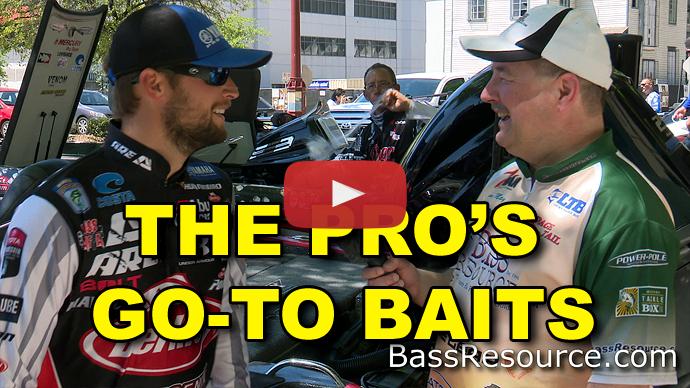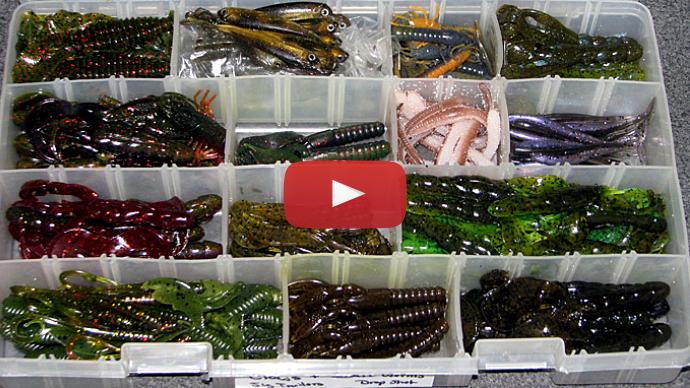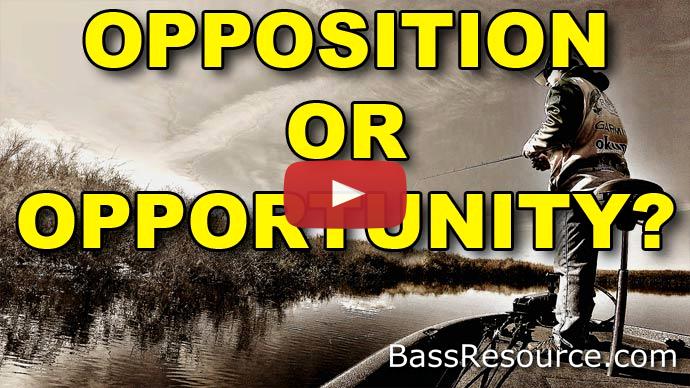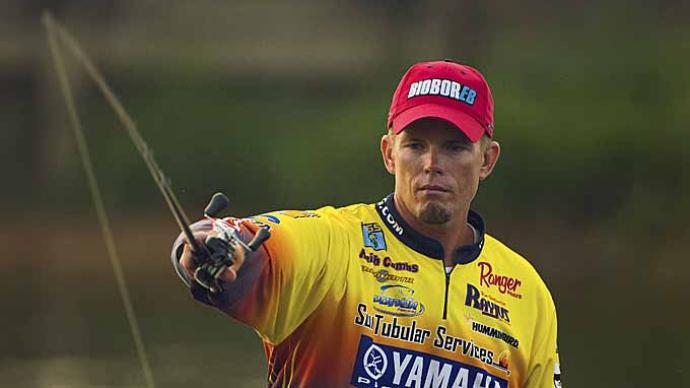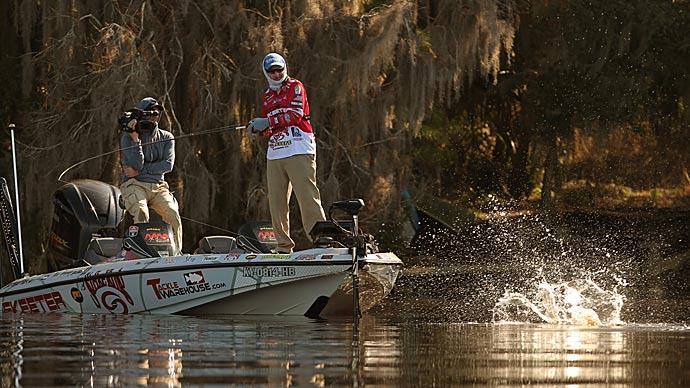Glenn: Hey folks Glenn May here with BassResource.com and today I'm asking the elite pros questions that you submitted on our forums. Let's see what they have to say.
Hey Chris, I've got some questions for you, that users have submitted to us and members have submitted to us on the forums.
Chris Zaldain: Yeah.
Glenn: Let's jump right into it.
Chris: Yeah. Awesome website, I do Google searches all the time and your website pops up all the time.
Glenn: Thank you. I appreciate that. So Sean from Columbus, Alabama. He says, he asks, "What would you say you do during prep, practice or tournament day that sets you apart from the other anglers?"
Chris: Man, hands down, Sean, it's a good question. Hands down, I'm always on my phone looking at maps, looking at tournament results. Local tournament results. We just had a luncheon here and we're at Media Day. I was looking at the latest tournament results and there was a local tournament out here on Lake Conner last weekend. It's always good to know what's going on around you. Aerial photos, satellite imaging. I'm all...constantly on that stuff.
Constantly on it and I know some guys are starting to use it, but I go above and beyond. I zoom in to every little high spot, low spot. Anything I think could help me, I'll use it. I'll take these screenshots and use them as notes out on the water. So I definitely use all the satellite maps, the Navionics app, stuff like that. I use that stuff all the time.
My wife gets mad at me when I'm in bed at night and I'm looking at this thing and that's all right. She can have her social media, I'll have the maps.
Glenn: You know, it's funny you mentioned that, because it is a little more difficult to get used to looking at satellite images and finding small things like beaver huts.
Chris: It's challenging.
Glenn: They are not readily apparent, are they?
Chris: No, they are not. They really aren't. Beaver huts, that kind of stuff changes every year. But I like to look at like mountain structures, stuff like that, that are way up on the hill side or whatever it might be. A lot of times I look for little drains. Little drains that... And satellite imaging shows you that kind of stuff. A lot of times you could pick out drains.
Basically what I mean by a drain is when it rains, where all that flow ends up into the lake. Basically what that does is it brings all these nutrients into the lake and it brings life to that creek or that cut, whatever it might be.
So what I like to do, is I like to look for those shadows, those drains, those cuts. And a lot of times you'll see real green trees spotted along there, and that tells you it gets a lot of water flow. Especially when we get down to the gulf down here, when we're fishing. Brackish water, salt water type intrusion, deltas or whatever it might be. All you gotta do is look for the green trees on the satellite map, and there is your fresh water in-flow and that's where the bass are gonna be.
Glenn: Smart, real smart.
Chris: Yeah.
Glenn: Nice. Good advice guys. Pay attention to that one. Well, Kevin, we've got some questions from some people on our forums that want some questions from you. So I'm gonna ask them. Is that all right?
Kevin: Yeah, let's do it.
Glenn: All right, let's go. Sean from Columbia, Alabama. He says, "What would you say you do during prep, practice or tournament day that sets you apart from the other anglers?"
Kevin VanDam: Well, the one thing that I always try to do is control all the variables that I can. So making sure that your equipment's ready, change your line, replace treble hooks, things like that. Try to get everything organized in the boat so it's gonna maximize my time out on the water, on the competition day. So those are all variables that I can control.
You wanna look at the weather forecast so you can have a game plan for the day. And again, I wanna make sure that all my equipment is ready and prepared for even something that may come up during the day. So I wanna have those options ready, just so I can save time. I mean the more casts that you can make, the better your chance is to beat the competition, for sure.
Glenn: So what unique thing do you do, you feel is unique to what you do in preparing, getting your boat organized and ready for a tournament?
Kevin: It is...I'm really lucky to have Plano as a sponsor, because they have every option possible for my tackle. If you've got crankbaits, jerkbaits, spinnerbaits, plastics. Whatever it is, I've got a great system that keeps me organized. So I know exactly, if I'm looking for a KVD 1.5 in Sexy Shad, I know exactly which box it's in and where to go get it. If I'm looking for a bag of Rage Craws in green pumpkin, I know right where they're at in my boat and I can get to them quickly. So, knowing where everything is at and being able to access it quickly, being organized, not just having everything in a jumbled mess, is critical to save time in the water.
Glenn: Absolutely. You get more casts. You spend more time fishing than just digging around your tacklebox.
Kevin: You wanna be efficient.
Glenn: What would you say you do during prep, practice or tournament day that sets you apart from other anglers?
Brandon Palaniuk: I would say the biggest thing is decision making. Knowing when to bail on a certain technique or an area that's not working, and knowing when to stay and wait those fish out. And having an understanding of really what those fish are doing and where they're going, or where they're coming from. To be able to make those adjustments when weather conditions or fishing pressure, whatever it may be, that changes those fish.
Glenn: So how would you know when to make that change?
Brandon: It's really just all an instinctual thing. I rely and lean on all of the homework that I've done previously. So that goes into pre-practice and your practice, when tournament time comes around, to have the confidence to make those decisions and not second-guess yourself. That's the best thing you can do. If your gut tells you that you need to leave or if your gut says, "Stay here, the fish are coming," that's what you need to do, because at least you're not second-guessing yourself at that point.
Glenn: Yeah, it makes total sense. Absolutely. So it sounds to me it's really before you even get on the water, it's all the research that you do and really learning a body of water before you've even seen it, as much as you can, then applying that when you get on the water.
Brandon: Yeah, exactly. Having all of that homework and that information is what's gonna help build that ground, or that foundation, for making those decisions when it comes time to actually apply the situation.
Glenn: ...that sets you apart from the other anglers?
Gerald Swindle: I move around more in a practice and less in a tournament. I cover a tremendous amount of water in practice, not necessarily looking for bites, but looking for productive areas. So I think at the end of the practice, when you look at the amount of water I cover, I've had people ride before and say, "Dude, you probably cover more water in one day than I've covered in months." So I'm constantly on the move, just looking, because I wanna know what all my options are before the tournament starts.
Glenn: I got it, I could attest to that. Being in the boat with you during pre-practice, we did go everywhere.
Gerald: Everywhere.
Glenn: You covered a lot of deep, shallow. What's the methodology do you approach?
Gerald: I kind of jump, fish around and see what the fish are kind of doing. I may fish a jig deep, an eight to ten-foot, then I may bounce something, flip it on the bank. But I'm trying to fish till I get that bite or two that says, "Okay that's the deal right there." And I think for me to do that, I have to offer several different techniques and baits. But when I see it, then I immediately start putting stuff up and I zoom in and I home in right on that area.
Glenn: ...that sets you apart from the other anglers?
Justin Lucas: I would just say that preparation in general I feel like it's been a big key for me. Knowing where everything that I own is at all times. So when I need a bait, I know exactly where it's at. I spend a lot of time in the off season getting ready and making those preparations so that throughout the year, things flow a lot more smoothly for me. You can look in my truck right now, it's quite a bit cleaner than some of these other guys around here. So I feel like that helps me mentally, probably more than anything else, honestly.
Glenn: So being organized, being able to find that bait right when you need it, you spend more time fishing. Is that this concept?
Justin: Yeah. That and also keeping stuff simple. Knowing what I'm good at and the techniques that I typically do well at. I love to be a versatile angler, but at the same times there are certain things that I fall back on, that I just feel comfortable doing and I try and find those bites.
And this year I got off track on that a little bit, at the first tournament at Cherokee. But, hey, we got to keep living and learning. We're never gonna stop learning in this game. So take that experience as much as a good tournament, learn from it and go on. But definitely keeping your choices simple, staying organized. Those are two things for me that are high on my priority list.
Glenn: Makes total sense.
Glenn: ...that sets you apart from the other anglers?
Jason Christie: I don't know if it sets me apart, because I think there's a few guys that are a lot like me. I would say the biggest thing is, is I keep it simple. I have a rotation of baits that I look for and practice, because I feel like, if I win, it's gonna be on one of my confidence baits. That's how I try to find them and I try. I can't say I don't, because sometimes I get into that over-thinking. But the biggest thing is you don't wanna over-think it.
I mean, you're fishing for a fish and he's not all that smart. If he's there, he's probably gonna bite. But you just don't wanna over think the process and I try to do that in the tournament. It's easy to sit here and talk about it. It's a lot easier said than done. But I always try to do that. You can ask...Edwin stays with me or I stay with Edwin. However you wanna say it. I think if you ask him about me, I think he would just say simple, maybe a little stubborn, but simple.
Glenn: So just try not to over-think things, is what I'm hearing.
Jason: Right. Yeah. Don't make it a science. Don't try to put a formula behind it, just use your gut and just go fishing. Sometimes a lot of fishermen, the weekend fishermen, they try to make it a science. You know, "That fish was in 2.7 feet of water on a shady bank. I caught him on a frog. I can run everywhere that's 2.7." No. It was in 2.7 because it might have been the shade or he was just there. You may catch him from one to four. Just don't over-think it, just keep it simple.
Glenn: Watch that part over again, guys, that makes total sense.
Jason: Yeah.
Glenn: And there you have it. Great questions from the pros, answering your questions that were submitted on the forums on BassResource.com. For more videos like this, check out our YouTube channel or visit BassResource.com.

